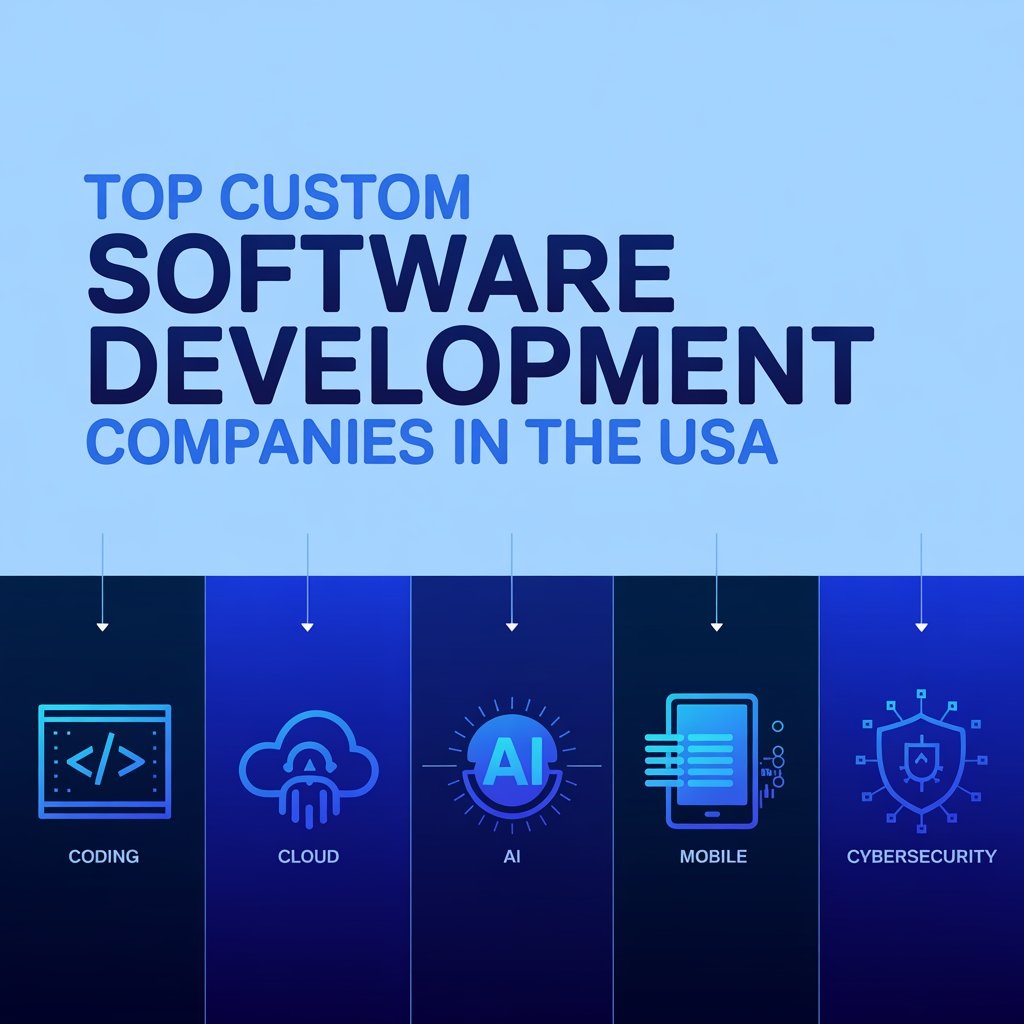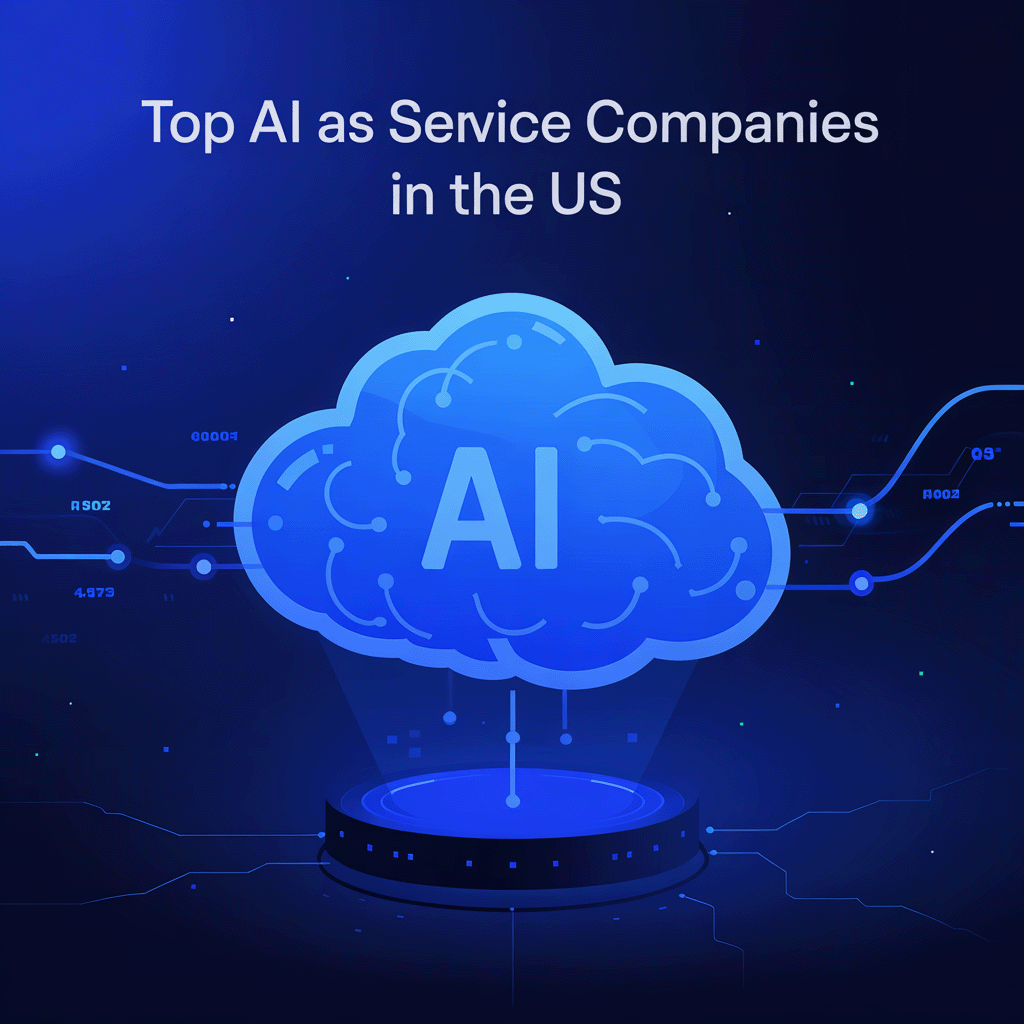Have you ever wondered why goods take forever to reach you, even when technology seems so advanced? Or why it’s hard to track where your food or medicines actually come from? These are real problems in supply chains today. Mistakes, delays, missing data, and fake products cost businesses billions every year. Here’s a number that will surprise you: the blockchain in the supply chain market is expected to hit $3.2 trillion by 2026. And it’s growing at a massive 53% every year. Why such growth? Because blockchain in supply chain management, especially when combined with IoT, blockchain supply chain tools, promises to fix the gaps with real-time data, traceability, and trust.
What Is Blockchain in Supply Chain Management?
Let’s break it down simply. A supply chain is the entire journey of a product, from raw material to the final customer. But many people, systems, and steps are involved. That’s where things go wrong. Blockchain in supply chain management means using a secure digital record, called blockchain, to keep track of every step in that journey.
Blockchain is a chain of data blocks that store records. These blocks are linked and cannot be changed. It’s like a shared spreadsheet that everyone in the supply chain can see and trust, but no one can secretly change.
So when a product moves from a farm to a factory, or from a warehouse to a store, the data is recorded and locked. Everyone sees the same thing. That’s why blockchain technology in supply chain can stop fake entries, prevent data loss, and make it easier to trace products. This forms the foundation of blockchain supply chain solutions that modern businesses are now exploring.
How Blockchain Works in Supply Chains
Here’s a quick look at how it works in real life. Every action or event, like harvesting a crop or shipping a box, gets recorded as a “block” of data. Each new block connects to the last one. So no one can mess with past records.
- Suppliers, transporters, and retailers can all add data.
- Every transaction is time-stamped.
- Smart contracts can trigger actions automatically.
- Everyone has the same copy of the data.
- Once entered, data can’t be changed.
- Audits become faster and easier.
This setup helps remove confusion and delays. It builds trust between companies and their partners. It answers the question, how is blockchain used in supply chain? Examples like food recalls or car part checks show the power.
Key Benefits of Blockchain Technology in Supply Chain
When businesses start using blockchain, they can expect more control, better data, and fewer mistakes. In fact, in the construction industry, blockchain helped boost information accuracy by 261% over traditional digital tools.
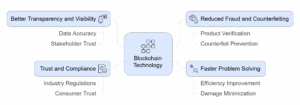
Here’s how blockchain helps in supply chain:
1. Better Transparency and Visibility
Everyone in the supply chain sees the same data. No more confusion over product status or shipment delays. Each block shows who did what, when, and where. This builds trust across the chain. No room for blame games or missing paperwork.
2. Reduced Fraud and Counterfeiting
Fake goods cost businesses a lot. But with blockchain technology in food supply chain or medicine tracking, it’s easier to verify the product’s origin. You can scan a code and check the full journey, from where it was made to where it is now. This helps stop fake products from entering the system.
3. Faster Problem Solving
If a batch of food is bad, traditional systems take days to trace the source. But with blockchain, this happens in seconds. Walmart used it to trace mangoes back to their farm in just 2.2 seconds, earlier it took 7 days. That means quicker fixes and less damage.
4. Trust and Compliance
Blockchain records are permanent. They help with audits and show compliance with industry rules. You can show proof easily, whether it’s about product safety or ethical sourcing.
Blockchain is transforming supply chain management by improving transparency, traceability, and trust across every step. If you’re new to the technology, this guide on what blockchain is offers a simple introduction to its core concepts.
Top Blockchain Supply Chain Use Cases by Industry
Every sector of industry can gain from clean, traceable data. Let’s explore where and how blockchain supply chain use cases work.
Food and Agriculture – Traceability from Farm to Fork
Food safety depends on knowing where your food comes from and how it is handled. With an agriculture supply chain blockchain, farmers record data at harvest. Transporters add temperature logs. Retailers note shelf life.
All this data stays on blockchain. If something goes wrong, like a foodborne illness, the source can be found in seconds. That saves lives and costs. For farmers, blockchain proves their goods are organic or ethically sourced. For buyers, it brings peace of mind.
Many companies now want blockchain technology in the food supply chain to meet new safety rules and rising customer demands.
Read How Blockchain in Agriculture Boosts Efficiency and Traceability for Farmers.
Retail and eCommerce – Product Authentication
Fake fashion, electronics, and accessories are a real problem. Brands lose money, and customers lose trust. But blockchain in the retail supply chain can solve this. Each item gets a digital record at creation.
This record includes where it was made, the materials used, and who handled it. Buyers can scan the product to check its entire journey. This keeps fake items out and builds brand trust. For e-commerce, it makes returns and checks easier, too.
Healthcare – Tracking Pharmaceutical Supplies
Fake or expired drugs can cause serious harm. But blockchain in the healthcare supply chain can stop this. Each drug pack gets a secure ID. From factory to hospital, its journey is recorded. Any tampering or delay is visible.
Doctors and patients can scan it and know it’s safe. For regulators, it simplifies audits and safety reports. This is one strong answer to why is blockchain important in supply chain? It protects lives.
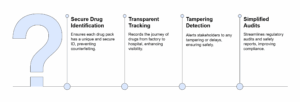
Automotive – Parts Sourcing and Verification
Cars need parts from many vendors. If one part fails, the cost can be huge. But with blockchain in automotive supply chain, parts are tracked from the supplier. Each one gets a unique code.
If a defect is found, blockchain helps recall only the affected cars, not all. Also, it prevents fake or used parts from entering new cars. This saves time and legal trouble.
Coffee and Beverage Industry – Ethical Sourcing and Transparency
People want to know their coffee isn’t linked to child labor or bad practices. Blockchain in coffee supply chain can show where beans were grown, who picked them, and how they were traded.
That means fair pay for farmers and ethical trade. Customers can scan and see the journey from farm to cup. Starbucks is using this system already.
International Trade and Logistics – Customs, Shipping, and Port Tracking
Goods move across borders, and that means customs, checks, and paperwork. This causes delays and errors. Blockchain for supply chains and international trade keeps all records in one digital file.
Ports, shippers, customs, and buyers all access the same data. This speeds up approvals, lowers corruption, and cuts paper use. It’s one of the key blockchain logistics applications today.
Businesses looking to streamline logistics and reduce fraud are increasingly turning to decentralized solutions. LITSLINK’s blockchain development services help create systems tailored to the complexities of supply chains.
Blockchain in Supply Chain Logistics and Finance
Goods need to move, but money needs to move too. Blockchain in supply chain logistics works well when linked with payments. If a ship arrives at the port and goods are fine, smart contracts release payments instantly.
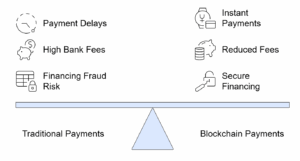
This removes delays and cuts bank fees. For small exporters, this is a game changer. Also, blockchain technology in supply chain finance means loans and credits can be based on actual shipment data. It reduces fraud in financing. It’s also useful for insurance claims when data is locked in blockchain.
Examples of Companies Using Blockchain in Supply Chain
It’s not just theory. Many top firms are showing how to implement blockchain in supply chain and getting results.
1. Walmart (Food Traceability)
Walmart wanted faster and safer food tracking. They utilized blockchain in supply chain logistics through Hyperledger Fabric. They traced over 25 items from five suppliers. Before blockchain, tracing a product took 7 days. With blockchain, it takes 2.2 seconds. That’s food safety in real time.
2. De Beers (Diamond Sourcing)
Diamonds often come from risky or unethical mines. De Beers uses blockchain to track gems from mine to shop. This stops conflict diamonds from entering the market. Each gem has a secure digital record.
3. Starbucks (Coffee Supply Chain)
Starbucks uses blockchain in coffee supply chain to share coffee origins with customers. Each bag can be traced to a farm. Farmers can prove they follow fair trade. This brings better prices and loyal buyers.
4. FedEx (Package Tracking)
FedEx uses blockchain logistics applications to track high-value packages. The data is shared with customs and buyers. This helps speed up delivery and solve claims.
How to Implement Blockchain in Supply Chain Operations
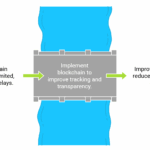
So, how to implement blockchain in the supply chain if you are a business? Start small. Choose a pain point. Use a pilot program. Build a team. Train them. Pick the right tech and partners.
Planning a blockchain-powered solution also requires a clear understanding of development scope and costs. The app cost calculator can help estimate what it takes to bring your supply chain idea to life.
IoT and Blockchain Integration in Supply Chains
IoT and blockchain are changing how supply chains work. When these two technologies come together, they give better control, cleaner data, and faster responses. IoT stands for Internet of Things, devices like sensors, trackers, and machines that collect data in real time. Blockchain confirms if the product met shipping timelines.
One pilot study showed an 85.1% drop in time overhead when switching from manual logs to blockchain-linked IoT.
It’s not just about tracking. Smart contracts can be triggered when IoT data meets preset rules. For example, when goods arrive undamaged and on time, payment is released automatically. No calls, no emails. This answers, in a real-world way, the question, how does blockchain technology impact supply chain performance?
Also, when you ask how is blockchain used in supply chain? Examples like cold chain transport, luxury product delivery, and medical supply logistics show how IoT and blockchain work better together. Companies can see everything happening in real time. They can trust the data. And they can act fast if something goes wrong.
The Future of Blockchain in Supply Chain Management
The future looks very active. More firms want trust, traceability, and cost control. From small farms to big ports, everything can be recorded and shared. It answers many big business questions about performance, safety, and ethics.
More regions will create rules that push for digital traceability. More sectors will use blockchain as a shared source of truth. From cross-border trade to farming co-ops, every step can be recorded and verified. This is where blockchain technology for enhancing supply chain resilience will grow fast.
1. AI + Blockchain for Predictive Supply Chains
When AI tools predict delays or demand shifts, blockchain can lock those forecasts and their actual outcomes. This creates a learning loop. For example, if AI predicts late delivery, and it happens, the system becomes smarter.
Every version of the prediction and the result gets saved on the blockchain. Over time, this trains the network and removes human bias. Forecasts get better. Inventory gets leaner. Customers stay happier.
2. Blockchain and Digital Twins
Digital twins are virtual models of physical assets. A cargo container or truck has a digital twin showing location, condition, and history. If a part breaks or the temperature rises, the twin shows it. With blockchain, these records can’t be edited later.
This gives manufacturers and shippers proof of what happened. For example, insurance claims get settled faster. Disputes go down. And products get fixed faster.
3. Sustainable Supply Chains with Blockchain
As climate goals tighten, companies need to prove their actions. Blockchain can store proof of sustainable farming, ethical labor, or green shipping. This helps meet new rules and earn customer trust.
For example, if a product says “recycled materials,” the blockchain record can show how and where. It shows facts, not claims.
4. More Cross-Border Standards and Partnerships
To grow, blockchain needs standard rules. More global groups are forming to set those. Customs, shipping lines, and payment firms are agreeing on data formats and contracts. This removes confusion and allows blockchain for supply chains and international trade to work across borders.
If you’re exploring blockchain integration for supply chain optimization, expert support can ensure a smooth rollout. You can contact the LITSLINK team to discuss your goals and next steps.
LITSLINK: Your Trusted Partner for Blockchain-Based Supply Chain Solutions
Thinking of using blockchain technology for enhancing supply chain resilience? We can help. LITSLINK builds easy-to-use, fast, and secure blockchain supply chain software.
Our team understands the tech and your business. From pilot to full rollout, we stay with you. Want better supply chain tracking? Want to cut fraud? Ready for faster operations? Let’s talk.
Still thinking, how does blockchain technology impact supply chain performance? Ask us how. Let’s build the right solution for your chain today.


